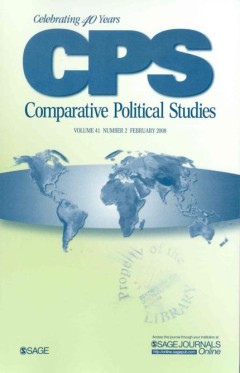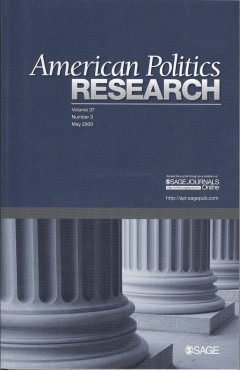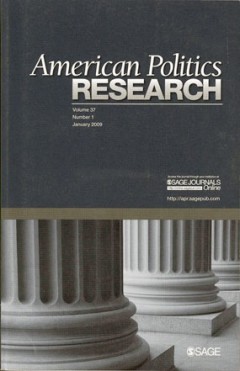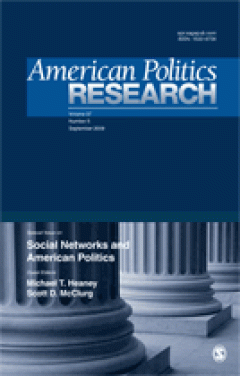Filter by

Ethnic Defection in Civil War
The study of ethnicity is dominated by constructivist approaches, yet empirical studies of civil war have been oblivious to their insights. In this article, the author examines the relationship between ethnic identity and civil war and points to several empirical instances of fluidity in the behavioral expression of ethnic identities within civil war. The author identifies two processes that ar…
- Edition
- Vol. 41, No. 8, August 2008. Page 1043-1068
- ISBN/ISSN
- 00104140
- Collation
- -
- Series Title
- Comparative Political Studies
- Call Number
- -

Political Leadership and the Emergence of Radical Mass Movements in Democracy
The perception of liberal democracy as a solidly institutionalized system in which opposition forces moderately compete with legitimate authority is so fixed that people are often surprised when mass radicalism emerges. Why, when, and how do radical mass movements emerge in pluralist (or semipluralist) political systems? The article, by linking radical action at the mass level with strategic ch…
- Edition
- Vol. 41, No. 8, Page 1117-1140
- ISBN/ISSN
- 0010-4140
- Collation
- -
- Series Title
- Comparative Political Studies
- Call Number
- -

Adopting Direct Democracy: Tests of Competing Explanations of Institutional C…
Why was direct democracy adopted in some U.S. states and not others? In this article, we sort through the various arguments advanced in the predominantly historical literature by using event history analysis. Among other factors we identify the importance of popular support for Populists and Socialists as well as the constraints imposed by state constitutions. We also find that the demographic …
- Edition
- Vol. 37, No. 6, November 2009.pp. 1024-1047
- ISBN/ISSN
- 1532-673x
- Collation
- -
- Series Title
- American Politics Research
- Call Number
- -

Unstable Politics: Fiscal Space and Electoral Volatility in the Indian States
What explains variations in electoral volatility? The authors argue that fiscal space�availability of financial resources to enact policy initiatives and provide public programs�possessed by governments can explain the level of electoral volatility. Where governments have fiscal space, citizens reward incumbent parties with their continued support. But when fiscal space is constrained, the incu…
- Edition
- Vol. 41, No. 8, Page 1069-1091
- ISBN/ISSN
- 0010-4140
- Collation
- -
- Series Title
- Comparative Political Studies
- Call Number
- -

Incompetence, Alienation, or Calculation?: Explaining Levels of Invalid Ballo…
This article focuses on the casting of invalid ballots and voting for extra-parliamentary parties. Drawing on evidence from more than 200 elections in Western Europe, Australia, New Zealand, and the Americas during the 1980-2000 period, it tests how well four sets of factors serve as explanations for the extent of such behavior in parliamentary contests. The main finding is that the structure o…
- Edition
- Vol. 41, No. 8, Page 1141-1164
- ISBN/ISSN
- 00104140
- Collation
- -
- Series Title
- Comparative Political Studies
- Call Number
- -

Sovereign Bond Ratings and the Democratic Advantage: Portfolio Investment in …
As developing countries expose portfolio investors to potential high risk, it is expected that investors will follow the advice of credit rating agencies (CRAs) before sending capital abroad. Controlling for political and economic explanations in the literature, the authors use panel data for 50 developing countries from 1987 to 2003 to determine if changes in CRA ratings affect portfolio flows…
- Edition
- Vol. 41, No. 8, Page 1092-1116
- ISBN/ISSN
- 00104140
- Collation
- -
- Series Title
- Comparative Political Studies
- Call Number
- -

Assessing Variation in Civil Society Organizations: China's Homeowner Associa…
Theories of civil society set high expectations for grassroots associations, claiming that they school citizens in democracy and constrain powerful institutions. But when do real-life organizations actually live up to this billing? Homeowner organizations in the United States and elsewhere have sparked debate among political scientists, criticized by some as nonparticipatory and harmful to the …
- Edition
- Vol. 41, No. 9, Page 1240-1265
- ISBN/ISSN
- 00104140
- Collation
- -
- Series Title
- Comparative Political Studies
- Call Number
- -

Economic Judgments, Party Choice, and Voter Abstention in Cross-National Pers…
This article proposes and applies a unified model of economic voting. The central claim of this article is that economic judgments affect the decision of whether to vote as well as how to vote. An analysis of cross-national survey data supports this claim, demonstrating that previous studies of economic voting have failed to identify the full relationship by omitting abstention. In addition, th…
- Edition
- Vol. 41, No. 9, Page 1290-1309
- ISBN/ISSN
- 00104140
- Collation
- -
- Series Title
- Comparative Political Studies
- Call Number
- -

Are Mapmakers Able to Target and Protect Congressional Incumbents?: The Insti…
Can those in charge of redistricting foster electoral competitiveness by targeting some congressional incumbents while protecting others from potent competition? We provide an answer by presenting the dynamic redistricting thesis, which holds that the type of redistricting plan and the time passed since its enactment affect the emergence of high-quality congressional candidates. We demonstrate …
- Edition
- Vol. 37, No. 6, November 2009.pp. 955-982
- ISBN/ISSN
- 1532-673x
- Collation
- -
- Series Title
- American Politics Research
- Call Number
- -

Political Accountability and the Room to Maneuver: A Search for a Causal Chain
Many studies of the room to maneuver make no provision for popular evaluation of policy. They assert rather than demonstrate popular satisfaction with policy choices and macroeconomic outcomes. The authors present a framework that explicitly models channels for popular preferences to influence policies and outcomes. Results for economic policy making in Britain do not support the room to maneuv…
- Edition
- Vol. 41, No. 9, Page 1212-1239
- ISBN/ISSN
- 00104140
- Collation
- -
- Series Title
- Comparative Political Studies
- Call Number
- -

Proclaiming Trade Policy: "Delegated Unilateral Powers" and the Limits on Pre…
This article examines presidential proclamations on trade policy, a category of presidential unilateral power that we call delegated unilateral power that is used frequently in creating or modifying trade policy, between the period 1974 and 2006 and tests the boundaries of the explanations predicted by the unilateral powers literature. We also find that the use of proclamations on trade policy …
- Edition
- Vol. 37, No. 6, November 2009.pp. 1003-1023
- ISBN/ISSN
- 1532-673x
- Collation
- -
- Series Title
- American Politics Research
- Call Number
- -

Crisis in the Eye of the Beholder: Economic Crisis and Partisan Politics in L…
This article analyzes the interaction between economic crises and partisan politics during International Monetary Fund program initiation in Latin America in the 1980s and Eastern Europe in the 1990s. The author argues that economic crises are at least in part in the eye of the beholder, and therefore policy responses reflect the interaction between crisis intensity and the government's partisa…
- Edition
- Vol. 41, No. 9, Page 1179-1211
- ISBN/ISSN
- 0010-4140
- Collation
- -
- Series Title
- Comparative Political Studies
- Call Number
- -

The Effect of Local Political Context on How Americans Vote
Neighborhood context could condition voting decisions, but systematic investigation of whether (how) the traits of a given locale shape individual voting decisions is sparse. We explore the possibility that local partisan balance affects turnout and the use of convenience voting in particular. Using comprehensive registered-voter lists from four swing states in the 2002 and 2006 elections, we f…
- Edition
- Vol. 37, No. 6, November 2009.pp. 1088-1115
- ISBN/ISSN
- 1532-673x
- Collation
- -
- Series Title
- American Politics Research
- Call Number
- -

Ideas in Two-Level Games: The EC—United States Dispute Over Agriculture in …
In 1992, the United States and the European Community (EC) reached an agreement on the Uruguay Round Agreement of Agriculture (URAA). A comparison of the EC's and the United States's initial agricultural proposals with the final agreement shows that the specific commitments agreed to reduce agricultural support and protection went a long way to accommodate EC agricultural interests. However, th…
- Edition
- Vol. 41, No. 9, Page 1266-1289
- ISBN/ISSN
- 00104140
- Collation
- -
- Series Title
- Comparative Political Studies
- Call Number
- -

Delegation and Discretion in Anticipation of Coalitional Drift
If legislators are sensitive to coalitional drift, they must perforce be forward looking. In this article, we propose that legislators anticipate change in government�and any associated coalitional drift. That is, legislators recognize that the government could move from unified to divided or divided to unified. As such, how legislators structure an agency�s discretion may be affected by the cu…
- Edition
- Vol. 37, No. 6, November 2009.pp. 983-1002
- ISBN/ISSN
- 1532-673x
- Collation
- -
- Series Title
- American Politics Research
- Call Number
- -

Punctuated Budgets and Governors’ Institutional Powers
State budgets are flexible: In the same year, some budget categories dramatically rise or fall, whereas others closely follow the previous year�s appropriation. Public policy scholars label a budget that contains mainly small scale changes interspersed with dramatic fluctuations as punctuated. This research seeks to identify the determinants of these punctuated budgets in the American states. W…
- Edition
- Vol. 37, No. 6, November 2009.pp. 1116-1138
- ISBN/ISSN
- 1532-673x
- Collation
- -
- Series Title
- American Politics Research
- Call Number
- -

Value Preferences and Ideological Structuring of Attitudes in American Public…
In this study, we investigate four attitudinal structures (including liberal, conservative, and libertarian configurations) associated with two ideological dimensions among American voters and demonstrate that these attitudinal structures are related in expected ways to differential preferences for the values of freedom, order, and equality/caring. Liberals are inclined to trade freedom for equ…
- Edition
- Vol. 37, No. 6, November 2009.pp. 1048-1087
- ISBN/ISSN
- 1532-673x
- Collation
- -
- Series Title
- American Politics Research
- Call Number
- -

Economic Reforms and Democracy: Evidence of a J-Curve in Latin America
This article explores the relationship between economic reforms and democracy in Latin America between 1970 and 1995. Existing theories suggest divergent effects across time horizons. The implementation of reforms� economic liberalization�may initially destabilize democracy due to popular backlash or overzealous reformers' usurpation of democratic institutions. However, the potential outcome of…
- Edition
- Vol. 41, No. 10, October 2008. Page 1398-1426
- ISBN/ISSN
- 00104140
- Collation
- -
- Series Title
- Comparative Political Studies
- Call Number
- -

Explaining the Dominance of Legacy Unions in New Democracies: Comparative Ins…
The continued dominance of legacy unions�state-backed unions inherited from the previous nondemocratic regime�has received little scholarly scrutiny. Through an analysis of Indonesia, this article presents a focused theoretical framework for analyzing the staying power of legacy unions and the strategies they pursue to maintain their dominance. The author argues that the capacity of legacy unio…
- Edition
- Vol. 41, No. 10, October 2008. Page 1371-1397
- ISBN/ISSN
- 00104140
- Collation
- -
- Series Title
- Comparative Political Studies
- Call Number
- -

Electoral and Mechanical Causes of Divided Government in the European Union
Voters who participate in elections to the European Parliament (EP) apparently use these elections to punish their domestic governing parties. Many students of the EU therefore claim that the party�political composition of the Parliament should systematically differ from that of the EU Council. This study shows that opposed majorities between council and parliament may have other than simply el…
- Edition
- Vol. 41, No. 10, October 2008. Page 1349-1370
- ISBN/ISSN
- 00104140
- Collation
- -
- Series Title
- Comparative Political Studies
- Call Number
- -
 Computer Science, Information & General Works
Computer Science, Information & General Works  Philosophy & Psychology
Philosophy & Psychology  Religion
Religion  Social Sciences
Social Sciences  Language
Language  Pure Science
Pure Science  Applied Sciences
Applied Sciences  Art & Recreation
Art & Recreation  Literature
Literature  History & Geography
History & Geography